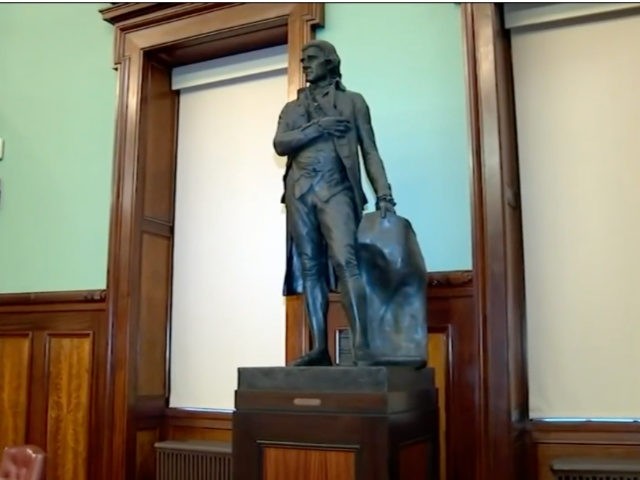You are using an out of date browser. It may not display this or other websites correctly.
You should upgrade or use an alternative browser.
You should upgrade or use an alternative browser.
Idiots tearing statues down in many cities
- Thread starter KennyB
- Start date
Great advice. I know so many people from Cuba, Argentina and now Mexico and they used to hate Trump but they realize that he is the only person in the way of complete and total destruction of what is a civilized society. People starving in Cuba and Venezuela eating out of garbage trucks and these idiots here drink the kool aide. Death to Bernie Sanders and all Marxists and socialists.
https://www.justice.gov/usao-dc/pr/...ing-tear-down-statue-andrew-jackson-lafayette
Put all these assholes in jail!
Trump has pictures on his Twitter of a >dozen more who were vandalizing federal monuments.
Put all these assholes in jail!
Trump has pictures on his Twitter of a >dozen more who were vandalizing federal monuments.
Lock them up, charge them with treason, throw away the key
It’s up to Trump to assert himself and call in the National Guard for help....arrest them and prosecute....get these thugs off the street....this is not protesting....do the same in Seattle and take the city blocks back....this action would do more for his re-election than hundreds of tweets could ever do...
Agreed
Once FL, GA , NC and TX complete their inevitable Blue transition we will pretty much control Texas&westward, the Canadian border states and the entire Eastern seaboard
You cats can have free rein for most all the landlocked states + ocean access thru LA, MS and AL
Now being as we will have about 2/3 of current states + 75% of people, we will expect to retain the title of The United States
You can give your territory a whole new name.....something like....Gilead
Bonus: You will make some big big $$ charging tolls on east/west freeways that intersect our two great nations
Win Win
Agree with this Lanquel, more federalism is the answer. Only way to relax the polarization going forward.
NYC to Remove Statue of Thomas Jefferson, Author of Declaration of Independence, 3rd U.S. President

Public art officials in New York City voted unanimously earlier this week to remove a 188-year-old statue of Thomas Jefferson, author of the Declaration of Independence and third president of the United States, from the city council chamber at City Hall.
The decision is based on the fact that Jefferson owned slaves. That fact is not mentioned in his biography posted on the White House website, which reads in part:
“There are a number of appropriate figures to honor in our seat of government who are more directly meaningful to our people and are more reflective of our city’s history than Thomas Jefferson,” Adams said.

Public art officials in New York City voted unanimously earlier this week to remove a 188-year-old statue of Thomas Jefferson, author of the Declaration of Independence and third president of the United States, from the city council chamber at City Hall.
The decision is based on the fact that Jefferson owned slaves. That fact is not mentioned in his biography posted on the White House website, which reads in part:
Freckled and sandy-haired, rather tall and awkward, Jefferson was eloquent as a correspondent, but he was no public speaker. In the Virginia House of Burgesses and the Continental Congress, he contributed his pen rather than his voice to the patriot cause. As the “silent member” of the Congress, Jefferson, at 33, drafted the Declaration of Independence. In years following he labored to make its words a reality in Virginia. Most notably, he wrote a bill establishing religious freedom, enacted in 1786.
Jefferson succeeded Benjamin Franklin as minister to France in 1785. His sympathy for the French Revolution led him into conflict with Alexander Hamilton when Jefferson was Secretary of State in President Washington’s Cabinet.
ABC reported on the move, based exclusively on slavery and race:Jefferson succeeded Benjamin Franklin as minister to France in 1785. His sympathy for the French Revolution led him into conflict with Alexander Hamilton when Jefferson was Secretary of State in President Washington’s Cabinet.
The City Council’s Black, Latino, and Asian caucus released a statement on the statue’s removal, citing a letter to Democrat New York City Mayor Bill de Blasio.
“This administration owes it to the more than five million New Yorkers of color our members – past, present and future – represent, to resolve that the individuals memorialized within the confines of our People’s House be reflective not only of the best traditions of our city’s history and its diversity but unquestionable character,” it read, in part.
Not everyone supports removing the statue, and it has become an issue in the New York City mayoral race. [Mayoral] candidates Curtis Sliwa and Eric Adams both shared their thoughts on the matter.
“Do we suddenly wipe out the images, the markings, the names of all those great patriots because they were slaveholders and slave holding was quite common at that time?” Sliwa said.“This administration owes it to the more than five million New Yorkers of color our members – past, present and future – represent, to resolve that the individuals memorialized within the confines of our People’s House be reflective not only of the best traditions of our city’s history and its diversity but unquestionable character,” it read, in part.
Not everyone supports removing the statue, and it has become an issue in the New York City mayoral race. [Mayoral] candidates Curtis Sliwa and Eric Adams both shared their thoughts on the matter.
“There are a number of appropriate figures to honor in our seat of government who are more directly meaningful to our people and are more reflective of our city’s history than Thomas Jefferson,” Adams said.
Uh oh....
https://www.smithsonianmag.com/history/new-research-alexander-hamilton-slave-owner-180976260/
Given liberals love Hamilton after his story was lionized on Broadway, I would think he is largely safe but not sure these days.
https://www.smithsonianmag.com/history/new-research-alexander-hamilton-slave-owner-180976260/
Given liberals love Hamilton after his story was lionized on Broadway, I would think he is largely safe but not sure these days.
Uh oh....
https://www.smithsonianmag.com/history/new-research-alexander-hamilton-slave-owner-180976260/
Given liberals love Hamilton after his story was lionized on Broadway, I would think he is largely safe but not sure these days.
It was Aaron Burr, Sir







